- Home
- Elif Shafak
Honor Page 3
Honor Read online
Page 3
Naze had lost so much blood she was fading in and out, her cheeks the colour of winter. A choice had to be made. The midwife knew it would be either the mother or the baby. There was no way she could save them both. Her conscience was as silent as a moonless night, and just as dark. All at once, she made up her mind. She would pick the woman.
At that moment Naze, lying there with her eyes clamped shut, dancing with death, bleeding umbrage, lifted her head and yelled: ‘No, you whore!’
It was a cry so shrill and forceful, it didn’t sound as if it had come out of a human being. The woman in bed had turned into a wild animal, famished and feral, ready to attack anyone who stood in her way. She was running in a thick forest where the sun cast shimmering gold and ochre reflections on the leaves – free in a way she had never been before. Those within hearing distance suspected she had lost her mind. Only the mad could scream like that.
‘Cut me, you bitch! Take him out,’ Naze ordered and then laughed, as if she had already crossed a threshold beyond which everything was a joke. ‘It’s a boy, don’t you see? My son is coming! You spiteful, jealous whore. Take a pair of scissors! Now! Cut my belly open and take my son out!’
Swarms of tiny flies whirred in the room, like vultures circling a prey. There was too much blood everywhere. Too much rage and resentment smeared on the carpets, the sheets, the walls. The air inside the room had become heavy, listless. The flies . . . if only the flies could be made to disappear.
Naze did not survive. Nor did the baby for long – the baby whose gender she had been wrong about the whole time. Her ninth infant, the child who killed her and then quietly passed away in her cot, was another girl.
So on that day in November 1962, as she lay awake in her maternity bed late into the wee hours, it was the thought that God could be so arbitrary that distressed Pembe. Here she was, only seventeen and already breastfeeding a son. She couldn’t help suspecting that from somewhere in the heavens, under a watery light, her mother was watching her with envy. Eight births, five miscarriages, one dead baby, and not one was a son . . . And here You are already giving a healthy boy to my hare-brained daughter. Why, Allah? Why?
Naze’s voice echoed in Pembe’s ears until it became a ball of fury that rolled down to her chest and nestled in her stomach. Hard as she tried to fend off her anxieties, she ended up only building new ones. They drew circles in her mind, spinning like a pegtop, and suddenly there was nowhere to hide from the evil eye that was her late mother’s gaze. Once she started paying attention to it, she noticed that gaze everywhere. It was in the grain and cashew nuts that she pounded in a stone mortar, turned into a paste and then consumed to enrich her milk. It was in the rivulets of rain that streamed down the windowpanes, in the almond oil that she applied to her hair at every bath, and in the thick, bubbly yoghurt soup that simmered on the stove.
‘Allah the Merciful, please make my mother shut her eyes in her grave and make my son grow up strong and healthy,’ Pembe prayed, rocking herself back and forth, as if it were she who needed to be put to sleep, not the baby.
*
The night Iskender was born, Pembe had a nightmare – as she had had many other times during her pregnancy. But this one felt so real that a part of her would never recover from it, never return from the liquid land of dreams.
She saw herself lying supine on an ornamental carpet, her eyes wide open, her belly swollen. Above her a few clouds slithered across the sky. It was hot, too hot. Then she realized the carpet was stretched over water, a rowdy river swirling under her weight. How is it that I’m not sinking, she thought to herself. Instead of an answer, the sky opened up and a pair of hands descended. Were they the hands of God? Or the hands of her late mother? She couldn’t tell. They cut open her belly. There was no pain, only the horror of being aware of what was happening. Then the hands pulled out the baby. It was a plump little boy with eyes the colour of dark pebbles. Before Pembe could touch him, let alone cuddle him, the hands dropped the baby into the water. He floated away on a piece of driftwood, like the prophet Moses in his basket.
Pembe shared the nightmare with only one person, her eyes bright and burning as she spoke, as if she had a fever. Jamila listened, and, either because she truly believed in it or because she wanted to free her twin of the terror of Naze’s ghost, she came up with an explanation.
‘You must have been jinxed. Probably by a djinni.’
‘A djinni,’ Pembe echoed.
‘Yes, sweetheart. The djinn love to take a nap on chairs and sofas, don’t you know? Adult djinn can make a dash for it when they see a human coming, but infants are not so fast. And pregnant women are heavy, clumsy. You must have sat on a baby djinni and crushed it.’
‘Oh, my God.’
Jamila twitched her nose as if she had caught a foul smell. ‘My guess is the mother must have come for revenge and put a spell on you.’
‘But what am I going to do?’
‘Don’t worry, there’s always a way to appease a djinni, no matter how enraged,’ said Jamila authoritatively.
And so, while Pembe was nursing her newborn, Jamila made her toss dry bread to a pack of stray dogs and rush away without looking back; throw a pinch of salt over her left shoulder and a pinch of sugar over her right; walk through newly ploughed fields and under spiderwebs; pour sacred rosewater into every cranny in the house, and wear an amulet round her neck for forty days. She thus hoped to cure Pembe of her fear of their late mother. Instead she opened the door to superstitions – a door Pembe had always known existed but through which she had never before ventured to go.
Meanwhile Iskender was growing. His skin the colour of warm sand, his hair dark and wavy and gleaming like stardust, his eyes brimming with mischief and his birthmark long gone, he smiled copiously, winning hearts. The more handsome her son grew, the more Pembe became terrified of things over which she had no control – earthquakes, landslides, floods, wildfires, contagious diseases, the wrath of Naze’s ghost, the vengeance of a mother djinni. The world had always been an unsafe place, but suddenly the danger was too real, too close.
Such was Pembe’s unease that she refused to give her son a name. It was a way of protecting him from Azrael, the Angel of Death. If the baby had no particular affiliation, she thought, Azrael would not be able to find him, even if he wished to. Thus the boy spent his first year on earth without a name, like an envelope with no address. As well as his second, third and fourth years. When they had to call him, they would say, ‘Son!’ or ‘Hey, lad!’
Why didn’t her husband, Adem, object to this nonsense? Why didn’t he take control of the situation and name his heir like every other man did? There was something holding him back, something stronger than his quick temper and male pride, a secret between the two of them that empowered Pembe and weakened Adem, pushing him away from home towards an underground world in Istanbul, where he could gamble and be the king, even if only for one night.
Not until the boy had turned five did Adem take the reins in his hands and announce that this could not go on for ever. His son would soon start school, and if he did not have a name by then the other children would make sure he had the most ridiculous one imaginable. Grudgingly, Pembe complied but only on one condition. She would take the child to her native village and get her twin’s and family’s blessings. Once there, she would also consult with the three village elders, who, by now, were as old as Mount Ararat, but still dispensing sage advice.
*
‘It was wise of you to come to us,’ said the first village elder, who was so frail now that when a door slammed near by its vibration shook him to the core.
‘It is also good that you did not insist on naming the baby yourself, like some mothers do nowadays,’ remarked the second elder, who had only one tooth left in his mouth – a little pearl shining out like the first tooth of a toddler.
The third elder then spoke, but his voice was so low, his w
ords so slurred, that no one understood what he said.
After a bit more discussion the elders reached a decision: a stranger would name the boy – someone who knew nothing about the family and, by extension, Naze’s spectre.
With a borrowed confidence Pembe agreed to the plan. A few miles away there was a stream that ran low in winter and frantically high in spring. The peasants crossed the water in a makeshift boat attached to a wire that had been stretched between the two banks. The journey was unsafe, and every year a few passengers would fall into the river. It was decided that Pembe would wait where the boat landed and ask the first man who got across to name her son. The village elders, meanwhile, would hide behind the bushes and intervene should the need arise.
Thus Pembe and her son waited. She was attired in a crimson dress that reached below her ankles and a black lace shawl. He was wearing his only suit and looked like a miniature of a man. Time crept by and the child got bored. Pembe told stories to entertain him. One of those stories would stand out in his memory for ever.
‘When Nasreddin Hodja was a boy he was the apple of his mother’s eye.’
‘Did she have apples in her eyes?’ he asked.
‘That’s an expression, my sultan. It means she loved him very much. The two of them lived in a nice cottage on the outskirts of the town.’
‘Where was the father?’
‘He had gone off to war. Now listen. One day his mother had to go to the bazaar. She said to him, “You should stay at home and watch the door. If you see a burglar trying to break in, start shouting at the top of your voice. That’ll frighten him away. I’ll be back before noon.” So Nasreddin did as he was told, not taking his eyes from the door for even a moment.’
‘Didn’t he have to pee?’
‘He had a potty with him.’
‘Wasn’t he hungry?’
‘His mother had left him food.’
‘Pastries?’
‘And sesame halva,’ Pembe said, knowing her son well. ‘After an hour, there was a knock at the door. It was Nasreddin’s uncle, checking on how they were doing. He asked the boy where his mother was and said, “Well, go tell your mother to come home early and prepare lunch for us. My family will stop by for a visit.”’
‘But he is watching the door!’
‘Exactly. Nasreddin was puzzled. His mother had advised him to do one thing and his uncle another. He didn’t want to disobey either of them. So he pulled up the door, saddled it on his back and went to get his mother.’
The boy chuckled but he quickly grew serious. ‘I wouldn’t do that. I would always choose my mother over my uncle.’
No sooner had he said this than they heard a noise. Somebody had crossed the stream and was walking towards them. To Pembe’s – and the village elders’ – surprise it turned out to be an old woman. She had a spectacularly aquiline nose, hollows under her wrinkled cheekbones and a set of crooked teeth. Her small, beady eyes constantly moved, refusing to settle anywhere.
Pembe told her that her son urgently needed a name and asked if she would kindly help, avoiding details like Naze’s ghost or the village elders waiting behind the bush. The old woman didn’t seem the least bit surprised. Leaning against her staff, she weighed something up in her head, calm and compliant, as if a request of this kind was the most ordinary thing in the world.
‘Mum, who is this?’ the child asked.
‘Hush, my lion. This nice lady here is going to give you a name.’
‘But she’s ugly.’
Pretending not to hear that, the woman took a step closer and scrutinized the boy. ‘So you haven’t found your name yet, I gather.’
The child raised his thin eyebrows, refusing to comment.
‘All right, well, I’m thirsty,’ she said, pointing to where the watercourse had formed an inlet. ‘Will you go and get me a cup of water?’
‘I don’t have a cup.’
‘Use your palms, then,’ the old woman insisted.
With a deepening frown the boy glanced at the woman, then at his mother, and then at the stranger again. ‘No,’ he said, a new edge to his voice. ‘Why don’t you go and get your own water? I’m not your servant.’
The woman tilted her head to one side, as if the words were a blow she had to dodge. ‘He doesn’t like to serve, does he? He only wants to be served.’
By now Pembe was convinced that they had picked the wrong person. To appease the situation she said in her most conciliatory tones, ‘I’ll go and get you water.’
But the woman didn’t drink the water Pembe brought to her, cupped in the palms of her hands. Instead she read it.
‘My daughter, this child will remain a boy for a long time and he will grow up only when he has reached mid-life. He will mature very late.’
Pembe gasped. She had the distinct impression that the woman was about to give away a secret, something she wasn’t supposed to reveal.
‘Some children are like the Euphrates, so fast, so rowdy. Their parents cannot catch up with them. I’m afraid your son will break your heart to pieces.’
The words fell between them like a stone hurled from out of nowhere.
‘But that’s not what I asked you,’ Pembe said, a bit tensely. ‘Have you thought of a name for him?’
‘Yes, I have. There are two names that might suit him well, depending on what you expect. One is Saalim. Once upon a time there was such a sultan. He was a poet and a fine musician to boot. May your son, too, learn to appreciate beauty should he be given this name.’
‘And the other?’ Pembe held her breath with anticipation. Even the boy seemed interested in the conversation now.
‘The second is the name of the great commander who always marched in front of his soldiers, fought like a tiger, won every battle, destroyed all his enemies, conquered land after land, united the East and the West, the sunrise and the sunset, and was still hungry for more. May your son, too, be invincible and strong-willed, and preside over other men should he be named after him.’
‘This one is better,’ said Pembe, her face brightening up.
‘Well, then, you are done with me.’
With that, the old woman grabbed her staff, and started to walk away down the road with a surprisingly agile gait. It took Pembe a few seconds to collect her thoughts before she ran after her.
‘But what is it?’
‘What is what?’ The woman turned and studied her – as if she had forgotten who she was.
‘The name! You didn’t tell me what it was.’
‘Oh! It is Askander.’
‘Askander . . . Askander . . .’ Pembe repeated with delight.
When they returned to Istanbul the boy was registered at the office of the local registrar. Though several years late, with a lot of pleading and a substantial bribe, his existence was legally accounted for. The name written on his card when he started school was Iskender Toprak.
‘A name worthy of a world leader,’ Pembe said. By then she had learned who Alexander the Great was.
So it was that her first child, the apple of her eye, would become Askander in Kurdish and Iskender in Turkish. When the family immigrated to London, to the children and teachers in his school, he was Alex – and this was the name he would be known by in Shrewsbury Prison, by convicts and guards alike.
A Prince in the Tree
Istanbul, 1969
The spring when he was not yet seven, Iskender ran away from a man whom he had never seen before but had heard much about. Although the man was different from what he had imagined, this made him no less frightening. He had thick-rimmed glasses that slid down his nose, an unlit cigarette between his lips and a large leather bag that was rumoured to contain sharp instruments and a piece of skin from each of his victims.
At the sight of him, Iskender felt a bolt of fear shoot along his spine. He spilled the cranberry sherbet i
n his hand, red drops trickling on to his white shirt, like blood on snow. He tried to wipe off the stain, first with his bare hands, then with the hem of his cape. It was no use. His beautiful costume was ruined.
Stain or no stain, he was still a prince in his long silvery cape and his cap studded with sparkling beads, carrying a sceptre so polished it was almost translucent. Throughout the afternoon he had sat in a high chair like a nobleman inspecting his lands – though being a bit short for his age all chairs were high for him. To his left were four boys, older and taller but similarly attired. As if sizing them up for a fight, Iskender had studied them from head to toe and decided their costumes were not as impressive as his.
While the other princes gobbled sweets and cracked jokes, Iskender waited, jiggling his legs. How could they be so silly when they knew what was about to happen? His eyes strayed anxiously. There were many people in the room, but he was certain that none would come to his rescue, not even his mother, Pembe, especially not her. She had wept all morning, telling him how proud she was that her little boy was becoming a man. For that is what you became when you were circumcised: a man.
Iskender couldn’t understand for the life of him how he would become a man with one cut of a knife. It was a riddle hard to solve. With less you became more. Nor could he fathom why he was told not to cry, though it was clear he would be hurt – while his mother could weep to her heart’s content, though absolutely nothing was happening to her.
Out of the corner of his eye he watched the man with the leather bag, noticing a scar that ran from his left cheek to his jaw. Perhaps one of the boys on whom he had operated had given him the wound. For a minute he indulged the idea, imagining how, just when the man was about to circumcise him, he would free himself of the hands holding him down, snatch the blade and slash his tormentor’s right cheek. Then he would help the other boys to their feet, and together they would dash for the door, victorious. But the fantasy faded away and the room came alive again – a blind hafiz reciting the Qur’an, a woman serving tea and almond paste, the guests chatting in hushed tones, and his most feared moment moving dangerously closer.

 Black Milk: On Writing, Motherhood, and the Harem Within
Black Milk: On Writing, Motherhood, and the Harem Within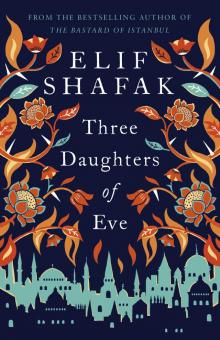 Three Daughters of Eve
Three Daughters of Eve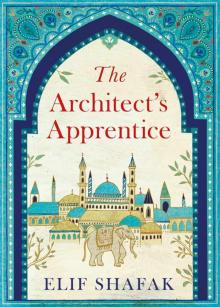 The Architect's Apprentice
The Architect's Apprentice The Gaze
The Gaze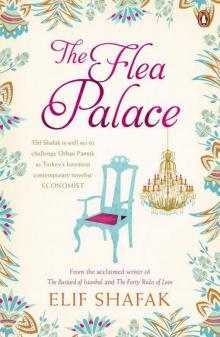 The Flea Palace
The Flea Palace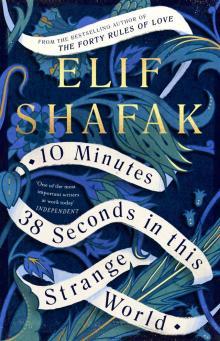 10 Minutes 38 Seconds in this Strange World
10 Minutes 38 Seconds in this Strange World The Forty Rules of Love
The Forty Rules of Love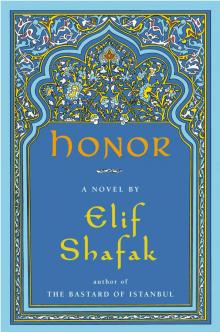 Honor
Honor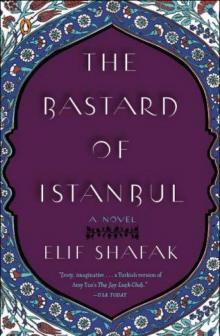 The Bastard of Istanbul
The Bastard of Istanbul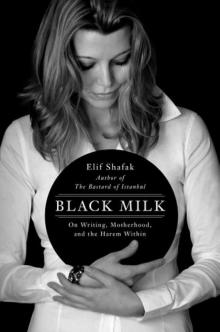 Black Milk
Black Milk The Happiness of Blond People (Penguin Specials)
The Happiness of Blond People (Penguin Specials)